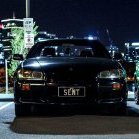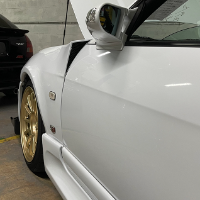BP Ultimate problems
Announcements
-
Similar Content
-
Latest Posts
-
Bit of an update to this one. Having some issues on the dyno that held us back (boost spiking) and I want to pass some info over you guys and see what you think is wrong with my setup. The current readout on this dyno is 462rwkw on a low reading dyno so keep in mind it is a real world 500rwkw setup on a hub dyno. Don't read into the power figure too much as a sign of the issue. The short and curly of it is: 2.8 Litre Racepace build RB25 NEO N/A Head with VCT (internally standard however ) Borgwarner EFR 8474 Turbosmart 50mm Straight Gate + Mac valve 6Boost Manifold 4" dump to full 4" exhaust (nil restrictions) Wastegate plumbed back in and all angles in the exhaust system are acceptable and not too sharp. GFB SV52 BOV in cooler piping Turbosmart BOV in EFR Housing The issue we are having is it comes onto full boost for example at 4000rpm and spikes to 24/25psi, before dropping down to 17psi before slowly rising back up to the target boost of 23psi. It was extremely uncontrollable and the tuner actually had to ramp in boost progrssively with each 1000rpm on each boost setting we selected to try and reduce the amount of spiking. Sometimes we would see a drop of 10psi from the peak at the beginning of the run, to the low, until it took the next 500-1000rpm to stabilise back up to the target boost. The tuner is pretty confident that the straight gate is just a poorly designed product and leaks too much boost upon cracking the gate open and theres no way to fix it other than going to a poppet valve. He's also confient theres no ignition breakdown or floating valves. The fueling is extremely stable as well. Turbo speed is somewhere around the 109,000rpm area. The spanner in the works for me is that prior to this Borgwarner and StraightGate, the car was tuned on -5 twins at a diferent tuner, and he also had issues controlling the boost with it spiking around the same rpm range, so to me this sounds like the same issue and it can't be anything on the turbo side as this was all changed and I think the behaviour is extremely similar, if not the same. We also removed the mac valve and did a run on wastegate pressure and it still spiked and had the same behaviour. My thoughts on possibilities are: Boost Leak VCT Cam Gear isn't reliably activating consistently - (On this however, we did a run with the VCT disabled and the boost still spiked) Turbosmart BOV is not handling the boost? However this seems unlikely to not be able to handle 20psi. I have a couple of logs that I can't make sense of if anybody knows how to read them and can obtain further logs of other parameters if they are not enough, happy to pay for anyones time. The dyno readout with the power figure is the most recent last week. The other picture is from two weeks prior to that where we couldn't break 400kw (we removed the cat), however the issue of the boost control persisted. @Lithium @Piggaz @burn4005 @GTSBoy @discopotato03 I've tagged those that were quite active in recent pages here, no disrespect to those that know turbos well but I missed tagging. Cheers
-
By Chocolate Cheesecake. · Posted
I recently purchased a 2018 Infiniti Q60, which has an SD card navigation map. I can see my system has options for real time traffic updates etc, and am wondering if there is something I can purchase to get this working? I can see there are at least updated maps for USA and Canada, but nothing for Australia. Surely Infiniti took changing road systems and city expansions into account when they decided to use an inbuilt navigation over Android Auto/Apple Car Play, or are we doomed to drive on streets that don't exist in the navigation system if you drive to a new area? -
Luckily I didn't put in etch primer as I just found out it's not compatible with my body filler lol. Also just need to sand the panel anywhere between 150-400 grit so I'm in the clear there. It does say to not apply to soft old paint, I assume that means paint that is flaking, peeling,etc
-
Yep will do, thanks for all the help.
-
By itsforandres · Posted
@dbm7 and @GTSBoy thank you both very much! will give that a shot!
-







Recommended Posts
Create an account or sign in to comment
You need to be a member in order to leave a comment
Create an account
Sign up for a new account in our community. It's easy!
Register a new accountSign in
Already have an account? Sign in here.
Sign In Now